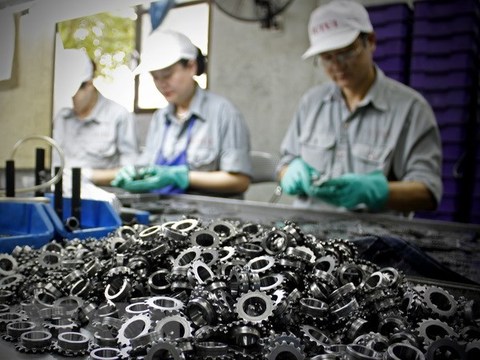
Workers at a factory in Hung Yen Province. Many supporting industry firms are in dire need of capital to invest in factories, technologies and human resources. — VNA Photo
Nine years after the issuance of a Government decision that set out preferential credit policies to provide more financial support for Vietnamese firms in the supporting industry, few have been able to make use of said policies, industry insiders have said.
Tran Thi Thu Trang, director-general of Hanel PT, an electronics maker in northern province Bac Ninh said her company had given up on seeking access to the preferential credit policies after extensive research.
Trang said it was extremely difficult to meet Government criteria for preferential credit, even for HanelPT, a relatively well-known name among Viet Nam’s electronics makers with more than 20 years in the industry, as policies tend to favour newly-established firms over existing ones.
“Of course, we can always go to the bank but interest rate hikes in recent years scare us. Without support from the Government, firms will be reluctant to take big leaps in infrastructure investments”, she said.
“It has translated to lost opportunities. We have turned away a number of large orders, the kind of orders that could help us break out and transform our firm because we would need to expand our production capacity by five to 10 times, which was nearly impossible to achieve on our own,” said Trang.
Some Vietnamese firms have been forced to sell out to foreign buyers because they were unable to cope with the financial pressure, especially after having to make large investments in infrastructure and machinery to stay competitive.
Realising the difficulties firms in the supporting industry have been facing, in a report sent to the Government the Department of Industry under the Ministry of Industry and Trade has pointed out that supporting industry firms are in dire need of capital to invest in factories, technology and human resources.
The department said current policies provide little or no support to firms, who often have to borrow from commercial banks at higher rates due to their capital-intensive and labour-intensive nature, which, makes it difficult for them to balance costs and efficiency.
Small-to-medium sized enterprises (SMEs) were shunned even more in current regulations, which requires them to put down a deposit equivalent to 15 per cent of the loan amount. This is difficult and impractical for most SMEs due to their small size and limited finances.
In addition, firms must go to the Vietnam Development Bank (VDB), whose network of offices and support staff is somewhat limited to large cities, to apply for preferential loans. The department advised that commercials banks should also be included to provide firms with preferential loans. It said commercial banks, with their extensive networks and expertise, will help not only reduce the strain on VDB but also better assess firms' ability to perform and pay their loans. — VNS